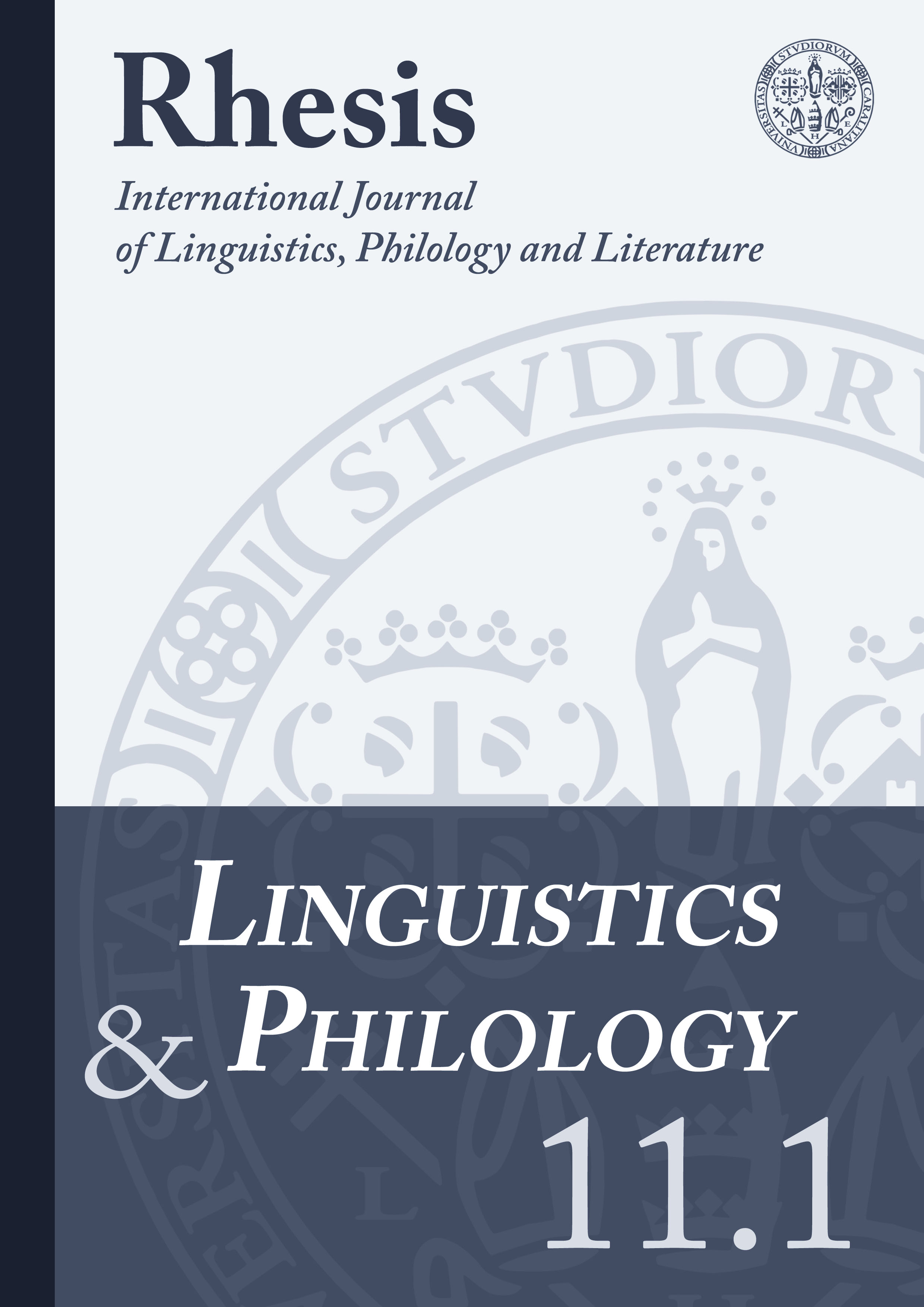Platone e gli indovini selvaggi: ragioni e termini di una polemica
Abstract
Plato’s dialogues occasionally testify to the existence of a bunch of mantic wanderers whom the philosopher accuses of savagery. This paper aims to investigate – on the basis of textual clues – the presence of this curious divinatory group throughout the platonic corpus, to examine the rhetorical tools the philosopher employs to describe it and to understand the reasons behind the attitude he adopts towards it.
Downloads
References
Bachtin, Michail (1979), L’opera di Rabelais e la cultura popolare. Riso, carnevale e festa nella tradizione medievale e rinascimentale, Torino, Einaudi (Tvorčestvo Fransua Rable i narodnaja kul’tura srednevekov’ja, Moskva, Chudozestvennaja literatura, 1965).
Bertolini, Sebastiano (2019), ‘Φιλάργυρον γένος. Abusing the Seer in Ancient Greek Poetry’, in Mastellari, Virginia; Hatton, Nikolina; Hobe, Sara (eds.), Hacks, Quacks & Impostors. Affected and Assumed Identities in Literature, Freiburg i.Br.-Berlin-Wien, Rombach Verlag KG, 61-76.
Burkert, Walter (1962), ‘ΓΟΗΣ. Zum griechischen ‘Schamanismus’’, Rheinisches Museum für Philologie 105, 36-55.
Burkert, Walter (1983), ‘Itinerant Diviners and Magicians: A Neglected Element in Cultural Contacts’, in Hägg, Robin (ed.), The Greek Renaissance of the Eight Century B.C.: Tradition and Innovation. Proceedings of the Second International Symposium at the Swedish Institute in Athens, 1-5 June, 1981, Stockholm, Svenska Institutet i Athen, 115-119.
Burkert, Walter (1992), The Orientalizing Revolution. Near Eastern Influence on Greek Culture in the Early Archaic Age, Cambridge Mass.-London, Harvard University Press (Die orientalisierende Epoche in der griechischen Religion und Literatur, Heidelberg, Carl Winter 1984).
Burnet, John (1907), Platonis opera, 5, Oxonii, Typographeo Clarendoniano.
Canevaro, Mirko (2017), ‘The Popular Culture of the Athenian Institutions: ‘Authorized’ Popular Culture and ‘Unauthorized’ Elite Culture in Classical Athens’, in Grig, Lucy (ed.), Popular Culture in the Ancient World, Cambridge, Cambridge University Press, 39-65.
Cerri, Giovanni (2007), La poetica di Platone. Una teoria della comunicazione, Lecce, Argo.
Collobert, Catherine; Destrée, Pierre; Gonzalez, Francisco J. (eds.) (2012), Plato and Myth. Studies on the Use and Status of Platonic Myths, Leiden-Boston, Brill.
DELG = Chantraine, Pierre (19992) [1968-1980], Dictionnaire étymologique de la langue grecque, Paris, Klincksieck.
Dickie, Matthew W. (2001), Magic and Magicians in the Greco-Roman World, New York, Routledge.
Dillery, John (2005), ‘Chresmologues and Manteis: Independent Diviners and the Problem of Authority’, in Iles Johnston, Sarah; Struck, Peter T. (eds.), Mantikê. Studies in Ancient Divination, Leiden-Boston, Brill, 167-231.
Dodds, Eric R. (2003), I greci e l’irrazionale, Milano, Rizzoli (The Greeks and the Irrational, Los Angeles, University of California Press, 1951).
Eidinow, Esther (2007), Oracles, Curses and Risk among the Ancient Greeks, Oxford, Oxford University Press.
Eidinow, Esther (2019), ‘Binding Spells on Tablets and Papyri’, in Frankfurter, David (ed.), Guide to the Study of Ancient Magic, Leiden-Boston, Brill, 351-387.
Faraone, Christopher A.; Obbink, Dirk (eds.) (1991), Magika Hiera. Ancient Greek Magic and Religion, Oxford-New York, Oxford University Press.
Giammellaro, Pietro (2001-2002), ‘Fuori e dentro la città. Incantatori e sacerdoti itineranti nella Grecia antica’, Hormos 3-4, 21-86.
Ginzburg, Carlo (1986), ‘Spie. Radici di un paradigma indiziario’, in Ginzburg, Carlo (ed.), Miti, emblemi, spie. Morfologia e storia, Torino, Einaudi, 158-193.
Ginzburg, Carlo (2009) [1976], Il formaggio e i vermi, Torino, Einaudi.
Graf, Fritz (2009) [1995], La magia nel mondo antico, Roma-Bari, Laterza (La magie dans l’antiquité gréco-romaine, Paris, Les Belles Lettres, 1994).
Graf, Fritz (2019), ‘Greece’, in Frankfurter, David (ed.), Guide to the Study of Ancient Magic, LeidenBoston, Brill, 115-138.
Gramsci, Antonio (1975), ‘Quaderno 5 (IX) 1930-1932: miscellanea’, in Gerratana, Valentino (ed.), Antonio Gramsci. Quaderni del carcere, 1, Torino, Einaudi, 539-682.
Havelock, Eric A. (1963), Preface to Plato, Cambridge-London, Harvard University Press.
Iles Johnston, Sarah (2008), Ancient Greek Divination, Malden-Oxford-Chichester, Wiley-Blackwell.
Iles Johnston, Sarah; Struck, Peter T. (2005), Mantikê. Studies in Ancient Divination, Leiden-Boston, Brill.
Jaeger, Werner W. (2003), Paideia. La formazione dell’uomo greco, Milano, Bompiani (Paideia. Die Formung des griechischen Menschen, Berlin-Leipzig, de Gruyter, 1934).
MacDowell, Douglas M. (1990), ‘The Meaning of ἀλαζών’, in Craik, Elizabeth M. (ed.), ‘Owls to Athens’. Essays on Classical Subjects Presented to Sir Kenneth Dover, Oxford, Clarendon Press, 287-292.
Parker, Holt N. (2011), ‘Toward a Definition of Popular Culture’, History and Theory 50 (2), 147-170.
Reale, Giovanni (2001), Platone. Ione, Milano, Bompiani.
Ribbeck, Otto (1882), Alazon. Ein Beitrag zur antiken Ethologie und zur Kenntnis der GriechischRömischen Komödie, Leipzig, Teubner.
Serafini, Nicola (2016), ‘Sacerdoti mendicanti e itineranti: gli agyrtai nell’antica Grecia’, Museum Helveticum 73, 24-41.
Slings, Simon R. (2003), Platonis Rempublicam, Oxonii, Typographeo Clarendoniano.



